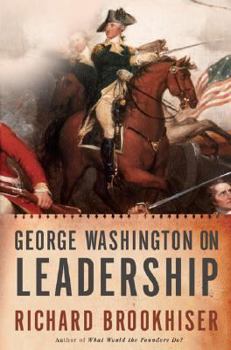George Washington on Leadership
Select Format
Select Condition 
Book Overview
FIRST IN WAR, FIRST IN PEACE, FIRST IN LEADERSHIP. Richard Brookhiser's revolutionary biography, Founding Father, took George Washington off the dollar bill and made him live. Now, with his trademark... This description may be from another edition of this product.
Format:Hardcover
Language:English
ISBN:0465003028
ISBN13:9780465003020
Release Date:May 2008
Publisher:Basic Books (AZ)
Length:269 Pages
Weight:1.25 lbs.
Dimensions:1.0" x 6.5" x 9.3"
Customer Reviews
5 ratings
Noteworthy use of Washington as a model
Published by Thriftbooks.com User , 15 years ago
Richard Brookhiser, a National Humanities Medalist, is a popular author, journalist and biographer. Considering his stellar previous work about America's founding fathers, as well as his deep knowledge of George Washington, you would expect his book about the first U.S. president's leadership traits to be good. And so it is, interesting and full of well-told stories. Yet, it does falter sometimes. For example, the opening chapter lauds Washington's prescience for installing latrines in his soldiers' encampments. Such praise overlooks the fact that the Roman Army routinely dug latrines for its soldiers 2,000 years ago. Overall, Brookhiser usefully translates episodes from Washington's life into management lessons for today's executives, though it may strain the use of metaphor to rename his Mount Vernon plantation WashCorp and to classify the presidency as a start-up. Despite such small lapses, Brookhiser works many intriguing anecdotes into his narrative and demonstrates vividly just how Washington became such a significant leader. getAbstract welcomes his history-based examination of how to use Washington's leadership lessons.
His nation's first chief executive officer
Published by Thriftbooks.com User , 15 years ago
Richard Brookhiser draws upon a wealth of historical material to identify and then discuss leadership lessons to be learned from George Washington's life and career, lessons that remain relevant after more than 200 years. All leaders attract followers but only great leaders sustain the support of their followers. That is certainly true of Washington who was, according to contemporary accounts, an extraordinarily attractive man with a commanding presence whom everyone trusted, even those who strongly disagreed with some of his military decisions and later, with other of his decisions when serving as the first president of the United States. Washington was what Bill George would describe as an "authentic" leader. More specifically, George refers to "the internal compass that guides you as a human being at your deepest level. It is your orienting point - your fixed point in a spinning world - that helps you stay on track as a leader. Your True North is based on what is most important to you, your most cherished values, your passions and motivations, the sources of satisfaction in your life. Just as a compass points toward a magnetic field, your True North pulls you toward the purpose of your leadership." Gradually over time, Washington realized that the thirteen colonies had no choice but to seek their independence rather than continue as, in effect, indentured servants to an absentee owner. He agreed to serve as the commanding general of what was necessarily a disorganized and untrained citizen army that lacked sufficient resources. Throughout the colonies' struggle for independence, Washington remained faithful to his own True North. The same can also be said of him during his two terms as president and while various business activities created financial independence for him. Having previously read Brookhiser's biographies of Washington and Alexander Hamilton, I was eager to learn how he would present the material in this book with a focus primarily on relevant lessons to be learned about leadership. Once again, his vast knowledge about the colonial period and (especially) about the founding fathers serves him well as does his crisp writing style, one that is comparable with George Orwell's and E.B. White's in their prime. The seven specific leadership lessons are best revealed with Brookhiser's narrative rather than listed in this commentary, out of context. Here is a representative selection of brief excerpts that are provided to suggest the thrust of what Joseph Ellis describes as Brookhiser's "distinctive voice and sharp interpretative edge." "Washington's own instinct was always to attack. He never read the Aeneid, Virgil's epic about the founding of Rome, but he didn't have to believe that audentis fortuna iuvat - fortune favors the bold...Faced [in 1776] with this array of strategies, Washington displayed an aspect of his leadership that was as deeply ingrained as the urge to fight: a disposition to consider his options." (Page 27)
History polished...
Published by Thriftbooks.com User , 16 years ago
A fine account of Washington's trials & tribulations during the birth of our Nation as culled from his (and other's of that time) writings; an inside look at the leadership "chess moves" facing political statesmen. This account ranks up there with Machiavelli's "The Prince"...
Learning more about History
Published by Thriftbooks.com User , 16 years ago
I am well pleased with the book I purchased, as well as convenience in ordering. This is not my first purchase, and have been very pleased with other items I bought.
Good book on leadership
Published by Thriftbooks.com User , 16 years ago
If you are looking for a good book on leadership and you need to decide on the myriad of books available on the subject, go with this one. Drawing on experiences from Washington's life, Brookhiser gives valuable insights to how Washington handled the many challenges he faced and then explains how we can use those techniques in our lives.





